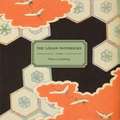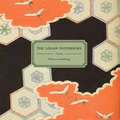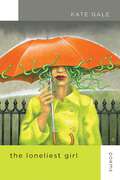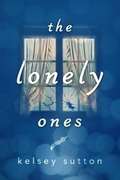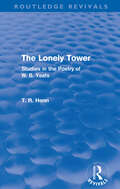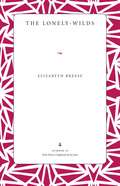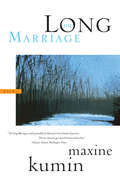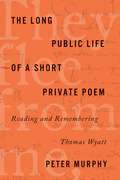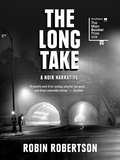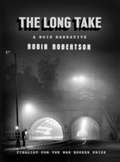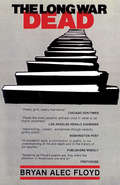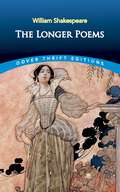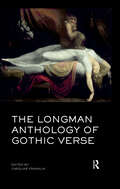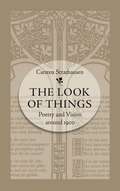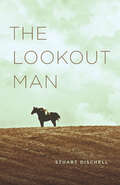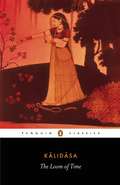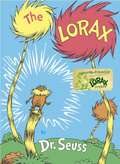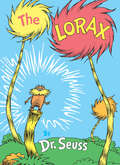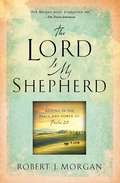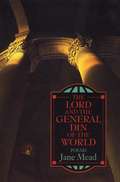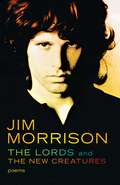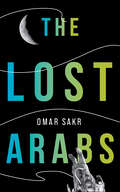- Table View
- List View
The Logan Notebooks
by Rebecca LindenbergClouds, mountains, flowering trees. Difficult things. Things lost by being photographed. Things that have lost their power. Things found in a rural grocery store. These are some of the lists, poems, prose poems, and lyric anecdotes compiled in The Logan Notebooks, a remix and a reimagining of The Pillow Book of Sei Shonagon, a collection of intimate and imaginative observations about place--a real place, an interior landscape--and identity, at the intersection of the human with the world, and the language we have (and do not yet have) for perceiving it.
The Logan Notebooks (Mountain West Poetry Series #7)
by Rebecca LindenbergPublished by the Center for Literary Publishing at Colorado State University Mountain West Poetry Series “These poems are intent on calling out the migratory beauty of this world, in a neighbor-voice: friendly, from the yard nearby, pointing out stuff we might not have noticed. They frequently employ that most ancient of forms, the list, to show us what we shine a light on, what we look past, what we reflect, what we miss. In that way, they speak like the meadowlark who says, See you! See you! These poems are for when we shall no longer fear the ecstatic, because we’ll know that ecstasy too is quotidian, as daily as a meadowlark’s shopping list.” —Eleni Sikelianos “In her second collection, Rebecca Lindenberg turns her scrutiny to the American West without forgetting the many layers of sediment and memory there and in other elsewheres. From grocery stores in Utah to a synagogue in Rome to cloud-gazing everywhere, in poems at turns laconic and lush, wistful and wry, Lindenberg shows how beauty and absurdity can and will persist—even, or especially—in the loss of our multiple loves and multiple selves.” —Tarfia Faizullah “Recursive and elliptical, the poems in Rebecca Lindenberg’s The Logan Notebooks are as difficult to depict as they are to forget. Like clouds (themselves, so omnipresent and imperative that Lindenberg confronts them on the first page), these poems shift, then settle into shape, then shift once again. More usual iterations of poetry give way to paragraphs of unimpeachable prose, itemized narratives in which whole, epic plots are cached. Lists run left to right as if they actually listed, like boats off-ballast or stand-alone willows in windstorms. Catalogues are first climactic then cathartic. What she does not write, she has somehow written. Aphorisms become offerings. Almost every line is a sutra. If ‘anyone who feels they have to lie’ is a thing that has lost its power, then Rebecca Lindenberg need not worry. Neither these poems nor the poet who conceives them flinches at gut-punch truth.” —Jill Alexander Essbaum “The American West, in its mythical and real-time complexity, is ‘itched out of reverie’ and ‘brought into the deep groove of the present’ in Rebecca Lindenberg’s The Logan Notebooks. The grotesquerie of capitalism hangs in the background, sometimes the foreground, but her lines don’t flinch as they ‘attend to these/details that might later/divert you.’ Above all this is a book about relationships—to a beloved, a family, a landscape, a country, and language itself. ‘Somewhere between the sayable and the unsayable,’ Lindenberg’s poems startle life from a fractured world. The Logan Notebooks is a balm and an anomaly.” —Joseph Massey Clouds, mountains, flowering trees. Difficult things. Things lost by being photographed. Things that have lost their power. Things found in a rural grocery store. These are some of the lists, poems, prose poems, and lyric anecdotes compiled in The Logan Notebooks, a remix and a reimagining of The Pillow Book of Sei Shonagon, a collection of intimate and imaginative observations about place—a real place, an interior landscape—and identity, at the intersection of the human with the world, and the language we have (and do not yet have) for perceiving it.
The Loneliest Girl: Poems (Mary Burritt Christiansen Poetry Series)
by Kate GaleWho was more alone than Medusa? Raped in Athena&’s temple, transformed into a monster, and banished into a cave, Medusa may be the ultimate example of victim blaming. In The Loneliest Girl, Kate Gale creates a powerful alternative narrative for Medusa and for all women who have carried guilt and shame—for being a woman, for not being enough, for being a victim. She offers a narrative in which women are the makers of the world—in which women find their way out from the cave of the Cisthene and into a world where they determine their own destiny.
The Lonely Ones
by Kelsey SuttonWhen your only friend is your own endless imagination, how do you escape your mind and connect to the world around you? With parents too busy to pay her attention, an older brother and sister who would rather spend their time with friends, and peers who oscillate between picking on her and simply ignoring her, it's no wonder that Fain spends most of her time in a world of her own making. During the day, Fain takes solace in crafting her own fantastical adventures in writing, but in the darkness of night, these adventures come to life as Fain lives and breathes alongside a legion of imaginary creatures. Whether floating through space or under the sea, climbing mountains or traipsing through forests, Fain becomes queen beyond--and in spite of--the walls of her bedroom.In time, Fain begins to see possibilities and friendships emerge in her day-to-day reality . . . yet when she is let down by the one relationship she thought she could trust, Fain must decide: remain queen of the imaginary creatures, or risk the pain that comes with opening herself up to the fragile connections that exist only in the real world? Told in breathless and visual verse, THE LONELY ONES takes readers through the intricate inner workings of a girl who struggles to navigate isolation and finds friendship where she least expects it. Praise for The Lonely Ones:* "Spare and poignant, every word of this haunting and elegant novel in verse feels painstakingly selected....Fain's story is simply a brilliantly crafted coming-of-age novel that will appeal to the hearts and minds of all readers who have ever felt alone."--Kirkus Reviews *STARRED REVIEW*"The lyrical free verse style moves the narrative swiftly along....Gorgeous writing distinguishes this short, but not shallow, read."--School Library Journal "This novel in free verse is exactly what a poetic novel should be...an immersive novel, like any good tale in which readers can take any individual poem and examine it in depth for word use, rhythm, and meaning."--VOYAFrom the Hardcover edition.
The Lonely Tower: Studies in the Poetry of W. B. Yeats (Routledge Revivals)
by Thomas Rice HennFirst published in 1965, this reissue of the second edition of T. R. Henn’s seminal study offers an impressive breadth and depth of meditations on the poetry of W. B. Yeats. His life and influences are discussed at length, from the impact of the Irish Rebellion upon his youth, to his training as a painter, to the influence of folklore, occultism and Indian philosophy on his work. Henn seeks out the many elements of Yeats’ famously complex personality, as well as analysing the dominant symbols of his work, and their ramifications.
The Lonely Wilds
by Elizabeth BreeseThe best & worst things happen here, but everyone loves the idea of honey. So here is my little bee hand in pocket edition, the rough-cut paper combs, dancing for the things it loves. The worst things are voices, wrong somehow & sour. If it is not elderly enough to totally crack its hips in my closed hand, I think of the long limping walk toward disaster.
The Long Marriage: Poems
by Maxine KuminThis luminous collection is Maxine Kumin's twelfth volume of poetry, the first since her remarkable memoir, Inside the Halo. Themes of loyalty, longevity, and recovery appear here, along with poems addressing the eminent dead: Wordsworth, Gorki, Rukeyser, and others. "Inescapably, many poems come up out of the earth I live on and tend to," Kumin says.
The Long Public Life of a Short Private Poem: Reading and Remembering Thomas Wyatt (Square One: First-Order Questions in the Humanities)
by Peter MurphyThomas Wyatt didn't publish "They Flee from Me." It was written in a notebook, maybe abroad, maybe even in prison. Today it is in every poetry anthology. How did it survive? That is the story Peter Murphy tells—in vivid and compelling detail—of the accidents of fate that kept a great poem alive across 500 turbulent years. Wyatt's poem becomes an occasion to ask and answer numerous questions about literature, culture, and history. Itself about the passage of time, it allows us to consider why anyone would write such a thing in the first place, and why anyone would care to read or remember the person who wrote it. From the deadly, fascinating circles of Henry VIII's court to the contemporary classroom, The Long Public Life of a Short Private Poem also introduces us to a series of worlds. We meet antiquaries, editors, publishers, anthologizers, and critics whose own life stories beckon. And we learn how the poem came to be considered, after many centuries of neglect, a model of the "best" English has to offer and an ideal object of literary study. The result is an exploration of literature in the fine grain of the everyday and its needs: in the classroom, in society, and in the life of nations.
The Long Take
by Robin RobertsonA stunning modern epic that innovatively combines noir narrative and lyrical poetry, The Long Take follows Walker, a survivor of D-Day, from bucolic Cape Breton to an America beset by paranoia and corruption.Walker is a D-Day veteran with post-traumatic stress disorder; he can’t return home to rural Nova Scotia, and looks instead to the city for freedom, anonymity, and repair. As he finds his way from New York to Los Angeles and San Francisco, we witness a crucial period of fracture in American history, one that also allowed film noir to flourish. The Dream had gone sour but — as those dark, classic movies made clear — the country needed outsiders to study and dramatize its new anxieties. Both an outsider and, gradually, an insider, Walker finds work as a journalist, and tries to piece his life together as America is beginning to come apart: riven by social and racial divisions, spiraling corruption, and the collapse of the inner cities.An epic for the modern world, it is a tale of damaged people trying to find kindness in the world, of cynicism and paranoia, and of redemption. Robin Robertson's fluid verse pans with filmic immediacy across the postwar urban scene — and into the heart of an unforgettable character. The Long Take is a genre-crossing work of stunning originality, beauty, and immediacy.
The Long Take: A noir narrative
by Robin Robertson**Shortlisted for the 2018 Man Booker Prize**From the award-winning British author—a poet's noir narrative that tells the story of a D-Day veteran in postwar America: a good man, brutalized by war, haunted by violence and apparently doomed to return to it, yet resolved to find kindness again, in the world and in himself.Walker is a D-Day veteran with post-traumatic stress disorder; he can't return home to rural Nova Scotia, and looks instead to the city for freedom, anonymity and repair. As he finds his way from New York to Los Angeles and San Francisco, we witness a crucial period of fracture in American history, one that also allowed film noir to flourish. The Dream had gone sour but—as those dark, classic movies made clear—the country needed outsiders to study and to dramatize its new anxieties. Both an outsider and, gradually, an insider, Walker finds work as a journalist, and tries to piece his life together as America is beginning to come apart: riven by social and racial divisions, spiraling corruption, and the collapse of the inner cities. Robin Robertson's fluid verse pans with filmic immediacy across the postwar urban scene—and into the heart of an unforgettable character—in this highly original work of art.
The Long War Dead
by Bryan Alec Floyd"Terse, hard hitting poems that treat the Vietnam War in the style of the Spoon River Anthology: portraits (often posthumous) of 47 marines who served in Vietnam and what the war did to them." -- Los Angeles Herald Examiner
The Long Way Home
by Larry Dane BrimnerA child takes the long way home in order to collect an array of new pets.
The Longer Poems (Dover Thrift Editions)
by William ShakespeareAlthough we know him best as a playwright, Shakespeare was also a poet, living as he did in an age when the writing of verse enhanced an author's literary reputation as well as his social standing. It's thought that he turned to poetry early in his career, from 1592-94, while London's playhouses were closed during an outbreak of plague. This collection contains four of the Bard's longer poems, consisting of meditations on the themes of sex, guilt, and death.
The Longman Anthology of Gothic Verse
by Caroline FranklinGothic verse liberated the dark side of Romantic and Victorian verse: its medievalism, melancholy and morbidity. Some poets intended merely to shock or entertain, but Gothic also liberated the creative imagination and inspired them to enter disturbing areas of the psyche and to portray extreme states of human consciousness. This anthology illustrates that journey. This is the first modern anthology of Gothic verse. It traces the rise of Gothic in the late eighteenth century and follows its footsteps through the nineteenth century. Gothic has never truly died as it constantly reinvents itself, and this lively, illustrated and annotated anthology offers students the atmospheric poetry that originally studded terror novels and inspired horror films. Alongside canonical verse by Coleridge, Keats and Poe, it introduces readers to lesser-known authors excursions into the macabre and the grotesque. A wide range of poetic forms is included: as well as ballads, tales, lyrics, meditative odes and dramatic monologues, a medievalist romance by Scott and Gothic drama by Byron are also included in full. A substantial introduction by Caroline Franklin puts the rise of Gothic poetry into its historical context, relating it both to Romanticism and Enlightenment historicism. Although Gothic fiction has now been receiving serious critical attention for twenty years, Gothic verse has been largely overlooked. It is therefore hoped that this anthology will stimulate scholarly interest as well as readers pleasure in these unearthly poems.
The Look of Things: Poetry and Vision Around 1900
by Carsten StrathausenExamining the relationship between German poetry, philosophy, and visual media around 1900, Carsten Strathausen argues that the poetic works of Rainer Maria Rilke, Hugo von Hofmannsthal, and Stephan George focused on the visible gestalt of language as a means of competing aesthetically with the increasing popularity and "reality effect" of photography and film. Poetry around 1900 self-reflectively celebrated its own words as both transparent signs and material objects, Strathausen says. In Aestheticism, this means that language harbors the potential to literally present the things it signifies. Rather than simply describing or picturing the physical experience of looking, as critics have commonly maintained, modernist poetry claims to enable a more profound kind of perception that grants intuitive insights into the very texture of the natural world.
The Lookout Man (Phoenix Poets)
by Stuart DischellVivid poems full of drama and action by award-winning poet Stuart Dischell. Sometimes elegiac, sometimes deadly comic, and always transformative, The Lookout Man embodies the energy, spirit, and craft that we have come to depend upon in Stuart Dischell’s poetry. Inhabiting a mix of lyric structures, these poems are set in diverse locales from the middle of the ocean to the summit of Mont Blanc, from the backyards of America to the streets of international cities. There is a hesitant, almost encroaching wisdom in The Lookout Man, as Dischell allows his edgy vision and singular perspectives to co-exist with the music of his poems. In lines that close the book and typify Dischell’s work, he writes, “I will ask the dogwoods to remind me // What it means to live along the edges of the woods, / To be promiscuous but bear white flowers.”
The Lookout Man (Phoenix Poets)
by Stuart DischellVivid poems full of drama and action by award-winning poet Stuart Dischell. Sometimes elegiac, sometimes deadly comic, and always transformative, The Lookout Man embodies the energy, spirit, and craft that we have come to depend upon in Stuart Dischell’s poetry. Inhabiting a mix of lyric structures, these poems are set in diverse locales from the middle of the ocean to the summit of Mont Blanc, from the backyards of America to the streets of international cities. There is a hesitant, almost encroaching wisdom in The Lookout Man, as Dischell allows his edgy vision and singular perspectives to co-exist with the music of his poems. In lines that close the book and typify Dischell’s work, he writes, “I will ask the dogwoods to remind me // What it means to live along the edges of the woods, / To be promiscuous but bear white flowers.”
The Loom of Time
by KalidasaKalidasa is the major poet and dramatist of classical Sanskrit literature - a many-sided talent of extraordinary scope and exquisite language. His great poem, Meghadutam (The Cloud Messenger), tells of a divine being, punished for failing in his sacred duties with a years' separation from his beloved. A work of subtle emotional nuances, it is a haunting depiction of longing and separation. The play Sakuntala describes the troubled love between a Lady of Nature and King Duhsanta. This beautiful blend of romance and comedy, transports its audience into an enchanted world in which mortals mingle with gods. And Kalidasa's poem Rtusamharam (The Gathering of the Seasons) is an exuberant observation of the sheer variety of the natural world, as it teems with the energies of the great god Siva.
The Lorax
by Dr SeussLong before "going green" was mainstream, Dr. Seuss's Lorax spoke for the trees and warned of the dangers of disrespecting the environment. In this cautionary rhyming tale, we learn of the Once-ler, who came across a valley of Truffula Trees and Brown Bar-ba-loots, and how his harvesting of the tufted trees changed the landscape forever. With the release of the blockbuster film version, the Lorax and his classic tale have educated a new generation of young readers not only about the importance of seeing the beauty in the world around us, but also about our responsibility to protect it.
The Lorax
by Seuss<p>Celebrate nature with Dr. Seuss and the Lorax in this classic picture book about protecting the environment! <p><i>I am the Lorax. I speak for the trees.</i> <p>Dr. Seuss’s beloved story teaches kids to speak up and stand up for those who can’t. With a recycling-friendly “Go Green” message, The Lorax allows young readers to experience the beauty of the Truffula Trees and the danger of taking our earth for granted, all in a story that is timely, playful, and hopeful. The book’s final pages teach us that just one small seed, or one small child, can make a difference. </p>
The Lorax (Classic Seuss)
by Dr. SeussCelebrate Earth Day with Dr. Seuss and the Lorax in this classic picture book about protecting the environment! I am the Lorax. I speak for the trees. Dr. Seuss&’s beloved story teaches kids to speak up and stand up for those who can&’t. With a recycling-friendly &“Go Green&” message, The Lorax allows young readers to experience the beauty of the Truffula Trees and the danger of taking our earth for granted, all in a story that is timely, playful and hopeful. The book&’s final pages teach us that just one small seed, or one small child, can make a difference. Printed on recycled paper, this book is the perfect gift for Earth Day and for any child—or child at heart—who is interested in recycling, advocacy and the environment, or just loves nature and playing outside. Unless someone like you cares a whole awful lot, nothing is going to get better. It&’s not. &“Pretty much all the stuff you need to know is in Dr. Seuss.&” –President Barack Obama
The Lord Is My Shepherd: Resting in the Peace and Power of Psalm 23
by Robert J. MorganRob Morgan, bestselling author of Then My Soul Sings, explores the rich meaning behind the world’s best-known and most-loved poem—Psalm 23.The Lord is my shepherd; I shall not want.He makes me to lie down in green pastures;He leads me beside the still waters… These are the opening lines to one of the most memorized, inspirational, and comforting passages in the Bible—and one of the greatest poems of all time. In six verses, it provides a microcosm of God’s grace. When anxiety robs us of sleep, our most powerful “tranquilizer” is Psalm 23. It’s a soul-soother. It appears in the middle of a trilogy of psalms dealing with our past, our present, and our future needs. In The Lord is My Shepherd, Morgan teaches Psalm 23 verse-by-verse, explaining its extraordinary power to change lives and ease our troubles. He shares its fascinating context and colorful background, as well as his own charming, real-life stories of herding sheep. You’ll find encouragement to enjoy the “green pastures” of life while becoming strengthened by the “dark valleys.” Furthermore, Morgan maintains that some of the Bible’s richest truths are summarized in these six simple verses of Psalm 23. In knowing the Good Shepherd, we have total resources for all our internal, external, and eternal needs. Through this clear explanation of the biblical text and great stories that illustrate the love and care of the shepherd, The Lord is My Shepherd will help you rediscover the joy, inspiration, and peace in the green pastures of this beloved psalm.
The Lord and the General Din of the World
by Jane MeadCrossed and recrossed with a plain speech that is haunting in its directness, Mead's language firmly places the fact of suffering back on our plate. Yet she doesn't force us to eat, nor does she insist that we take her word for it--but we do take her at her word. These fully realized poems remind us of Robert Lowell's darker half--not as worldly, though worldly enough to make us feel as though we've taken a very long journey. And hers is a psalm or a prayer that we can understand; even when her pen leans into the very insular facts of a father in detox and his cruel role in her childhood, the echo of her song is understood, and a real sense of her experiences comes across. Jane Mead is well deserving of the literary prizes she has won, and her first book is well deserving of many readers she is sure to gain.
The Lords and The New Creatures
by Jim MorrisonOriginally published as two separate volumes in 1969, Jim Morrison&’s first published volume of poetry gives a revealing glimpse of an era and the man whose songs and savage performances have left an indelible impression on our culture.Intense, erotic, and enigmatic, Jim Morrison&’s persona is as riveting now as the lead singer/composer &“Lizard King&” was during The Doors&’ peak in the late sixties. His fast life and mysterious death remain controversial even to this day. The Lords and the New Creatures, Morrison&’s first published volume of poetry, is an uninhibited exploration of society&’s dark side—drugs, sex, fame, and death—captured in sensual, seething images. Here, Morrison gives a revealing glimpse at an era and at the man whose songs and savage performances have left their indelible impression on our culture.
The Lost Arabs
by Omar SakrVisceral and energetic, Sakr&’s poetry confronts the complicated notion of &“belonging&” when one&’s family, culture, and country are at odds with one&’s personal identity. Braiding together sexuality and divinity, conflict and redemption, The Lost Arabs is a fierce, urgent collection from a distinct new voice.
